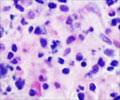Researchers from the University of Michigan say that percutaneous image-guided biopsy is of a great help in kidney disease and can help significantly in accurately diagnosing and predicting clinical outcomes. The researchers arrived at these conclusions after reviewing reviewed 153 kidney biopsies in 126 patients. They found that the biopsy results altered the decisions in 60 percent of the patients who were to undergo surgery, tumor ablation, chemotherapy or radiation. It also resulted in avoiding 75 complete renal removals.
"When a patient has a kidney mass, options include an open surgical procedure or an image-guided percutaneous biopsy. Percutaneous means that the procedure is performed through the skin, through a tiny incision (only 3-4 mm). Imaging guidance (either ultrasound or CT) allows us to watch our needle as it enters the mass, decreasing the risk of damage to adjacent structures and ensuring that we are sampling the correct tissue," said Katherine Maturen, MD, lead author of the study.According to the researchers, these procedures are performed under conscious sedation with local anesthesia to numb the skin where the needle will enter. The procedure takes about half an hour in most cases, and after a four-hour observation period, patients are free to go home. According to the researchers, although the acceptance of percutaneous image-guided biopsy has increased among physicians in recent years, many continue to avoid the biopsies because of concerns about poor sensitivity and a high rate of non-diagnostic biopsy, all based on data from old techniques including fine needle aspiration. "We felt it was important to demonstrate that newer core biopsy techniques have a much greater success rate, and to quantify the extent to which these biopsies altered patient management," said Dr. Maturen.
"When a patient has a kidney mass, it isn't always clear what the treatment should be until we know the tissue type. Sometimes getting a small sample of tissue can make the difference between major surgery (partial or complete removal of the kidney) or a simple follow-up CT scan. If a mass is benign, a patient has been spared the loss of a kidney and may actually need no treatment at all. If a mass is malignant but something other than a cancer of kidney origin, the treatment may involve chemotherapy, radiation or another type of surgery entirely," said Dr. Maturen. The full results of the study will be presented on Monday, May 1, 2006 during the American Roentgen Ray Society Annual Meeting in Vancouver, BC.
Source: Eurekalert











